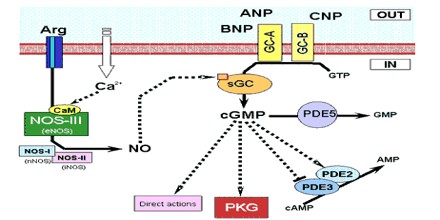A direct role of the atrial natriuretic factor in hypertension could be suspected for many reasons like Atrial Natriuretic Factor prevents and abolishes the vasoconstrictor effects of norepinephrine and angiotensin II, both in vivo and in vitro; atrial natriuretic factor is the most powerful natriuretic substance known; atrial natriuretic factor inhibits the synthesis and release of aldosterone; atrial natriuretic factor decreases the release of renin and antagonizes the effects of the renin-angiotensin system in a variety of tissues, and atrial natriuretic factor decreases cardiac output and plasma amount because of diuresis and a shift of fluid in the extravascular spaces. Atrial natriuretic factor also was shown to decrease blood pressure appreciably to control levels in rats made hypertensive by the two-kidney, one-clip method, the one-kidney, one-clip method, or administration of deoxycorticosterone acetate and salt as well as in spontaneously hypertensive rats and in Dahl salt-sensitive hypertensive rats.
In humans, infusions of an atrial natriuretic factor at rates that produce plasma concentrations between 350 and 600 pg/ml have been shown to cause a considerable decrease in both systolic and diastolic blood pressures in control subjects as well as in patients with essential hypertension. Therefore, investigators remain interested in studying the plasma concentration of immunoreactive atrial natriuretic factor in human essential hypertension.

Scholars explained that no increase was found in the plasma immunoreactive atrial natriuretic factor levels in 29 untreated patients with essential hypertension but without evidence of left ventricular dysfunction in comparison with regulating subjects. Investigation revealed that no details about the severity and cause of hypertension in the patients studied have also reported no significant change in plasma immunoreactive atrial natriuretic factor in hypertensive patients as compared with normotensive subjects. These various reports clearly show that the immunoreactive atrial natriuretic factor is normal in patients with borderline and mild essential hypertension but that it can be increased in a fourth to a third of the patients with moderate and severe essential hypertension, especially if the latter is complicated by incipient congestive heart failure.
In contrast, other groups reported a slightly but significantly elevated plasma concentration of immunoreactive ANF in patients with hypertension uncharacterized as to the severity, the presence or absence of left ventricular hypertrophy, and the cause of their hypertension. This slight but significant increase was attributable to the elevated levels in a fourth to a third of the patients. Some studies included several patients with severe hypertension and some degree of congestive heart failure, and other patients were even in states of hypertensive emergencies.